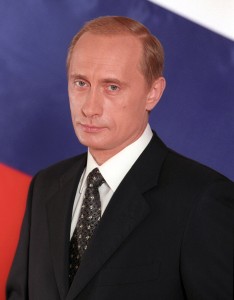Apparently Putin is difficult to understand:
The North Atlantic Treaty Organization, created in 1949 to contain the Soviet Union, said it’s not sure what Putin is trying to achieve with either his actions in Ukraine or his weapons program.
“We cannot fully grasp Putin’s intent,” the alliance’s top military commander, U.S. Air Force General Philip Breedlove, told Congress in April, according to the Defense Department’s website. “What we can do is learn from his actions, and what we see suggests growing Russian capabilities, significant military modernization and an ambitious strategic intent.”
I first studied economics back in the early eighties. The discussion of trade was perfunctory; trade was not considered particularly important to the US economy because, with the exception of oil, the US could produce pretty much everything it needed, and–just as importantly–most of what it wanted.
Modern orthodoxy maintains that trade makes one strong. This is fundamentally incorrect. Trade is necessary at times as a bootstrap up for industry, or to get things you truly cannot make yourself, but it can make you weak. The more you trade, the more vulnerable you are.
Russia is vulnerable. Putin turned Russia around by concentrating on hydrocarbon production and selling it to foreigners.
Commodity production is always a bad deal. No matter how rich it makes you, commodity prices are always boom or bust, and are always subject to technological obsolesence.
So, Russian defense spending:
Defense and the related category of national security and law enforcement now eat up 34 percent of the budget, more than double the ratio in 2010.
…
Putin signed documents creating what he called the “industrial battalions” program, which will give thousands of draftees the option of working in defense enterprises instead of joining the regular military.
After years of chronic funding problems for weapons makers, Russia has started to prepay for the goods and services it buys from the more than 1,300 organizations and 2.5 million people that make up the defense industry.
This is not hard to understand.
What part of Russian industry is most technologically advanced and does the world demand the most?
Weapons.
Russia needs to diversify what it exports. Military goods are the obvious market for which to do so. Really, there are only three sources for military goods: the West, China, and Russia.
Russia appears to have begun this strategy about 2012, before the oil price crash, the Ukraine, and so forth, but their vulnerability to oil price crashes was obvious. That the US was continuing to try to destabilize Russia’s near abroad and draw it into NATO was obvious as well.
Now, Syria.
What’s the problem with buying your weapons from the US?
Unless you’re a core US ally, the US is unreliable. If your government changes in ways the US doesn’t like, or if you are an enemy of US core partners (Israel, Saudi Arabia, etc.), they will cut you off from parts and ammunition at the drop of a hat, as well as canceling pre-paid orders.
But: The US was able to say that they had the best equipment. No one could compete.
What is happening in Syria is a demonstration that Russia can be counted on to help its allies—meaning its customers. It is a demonstration that Russia’s new weapons, and particularly its cruise missiles and airpower, are comparable to US product, and maybe, even in the case of its most advanced fighter/bomber, better.
It is a demonstration that if you buy Russian you aren’t buying crap that US-supplied forces can roll right over any more.
The Syria issue is a trade policy issue.
That is not to deny the geopolitical element to it, there certainly is one. But most analysts are not catching that this is also economic policy in action.
Shove Russia against a wall, impose sanctions, drive down the price of oil, and of course they will reach for what else they do well, and can sell.
The failure to anticipate this, the failure to understand this at the highest possible levels of NATO, when Putin had been telegraphing his strategy for years, is a terrible indictment of our “leadership”‘s competence.
Now, add to first class armaments and reliable supplies, a proper payments and banking system with China’s aid. Add China’s industrial goods and willingness to build infrastructure, and you have a second vertical capable of supplying virtually everything the West can do, and one which doesn’t care about the internal politics outside its near-abroad.
That new world isn’t quite here yet, but it’s almost.
If you enjoyed this article, and want me to write more, please DONATE or SUBSCRIBE.

